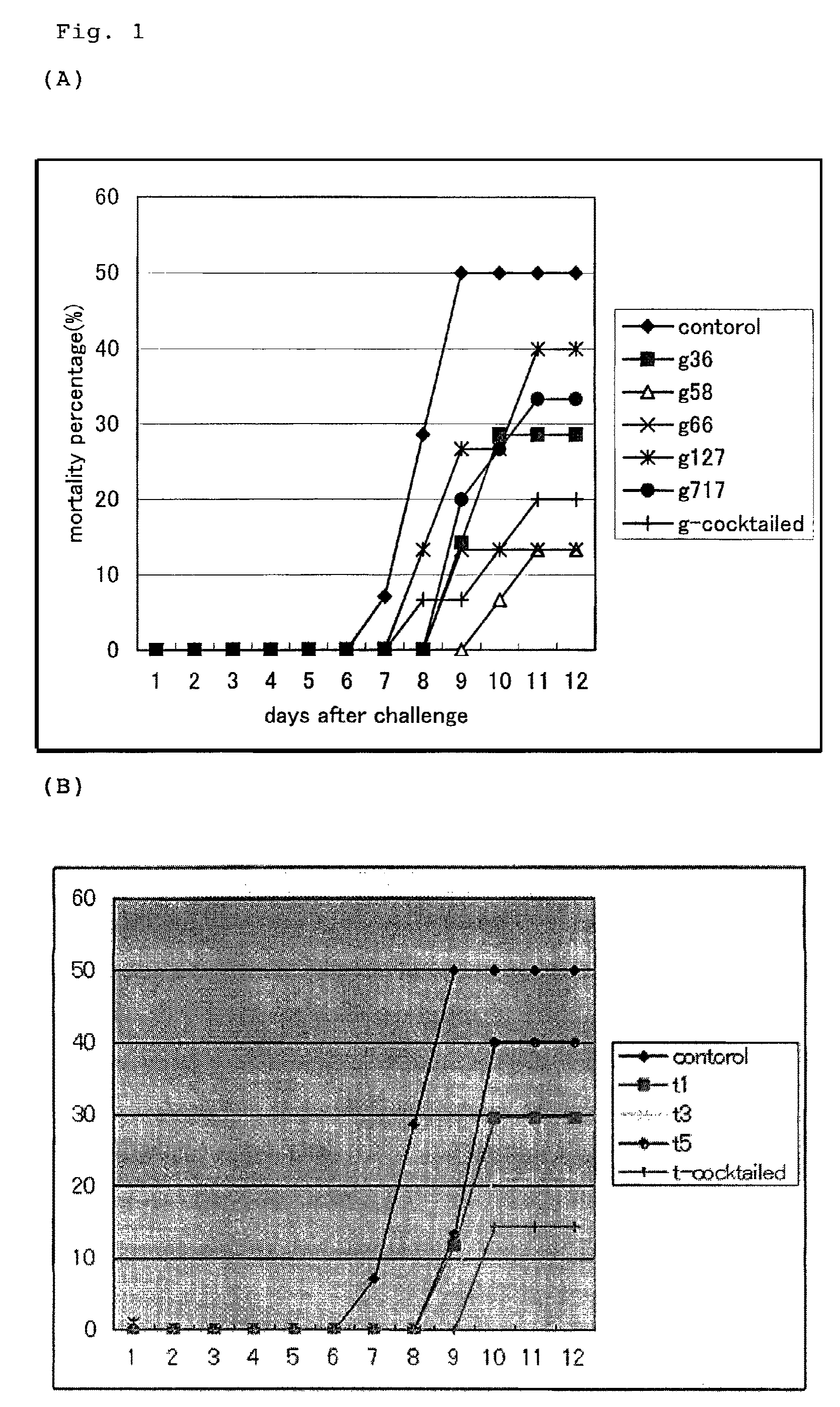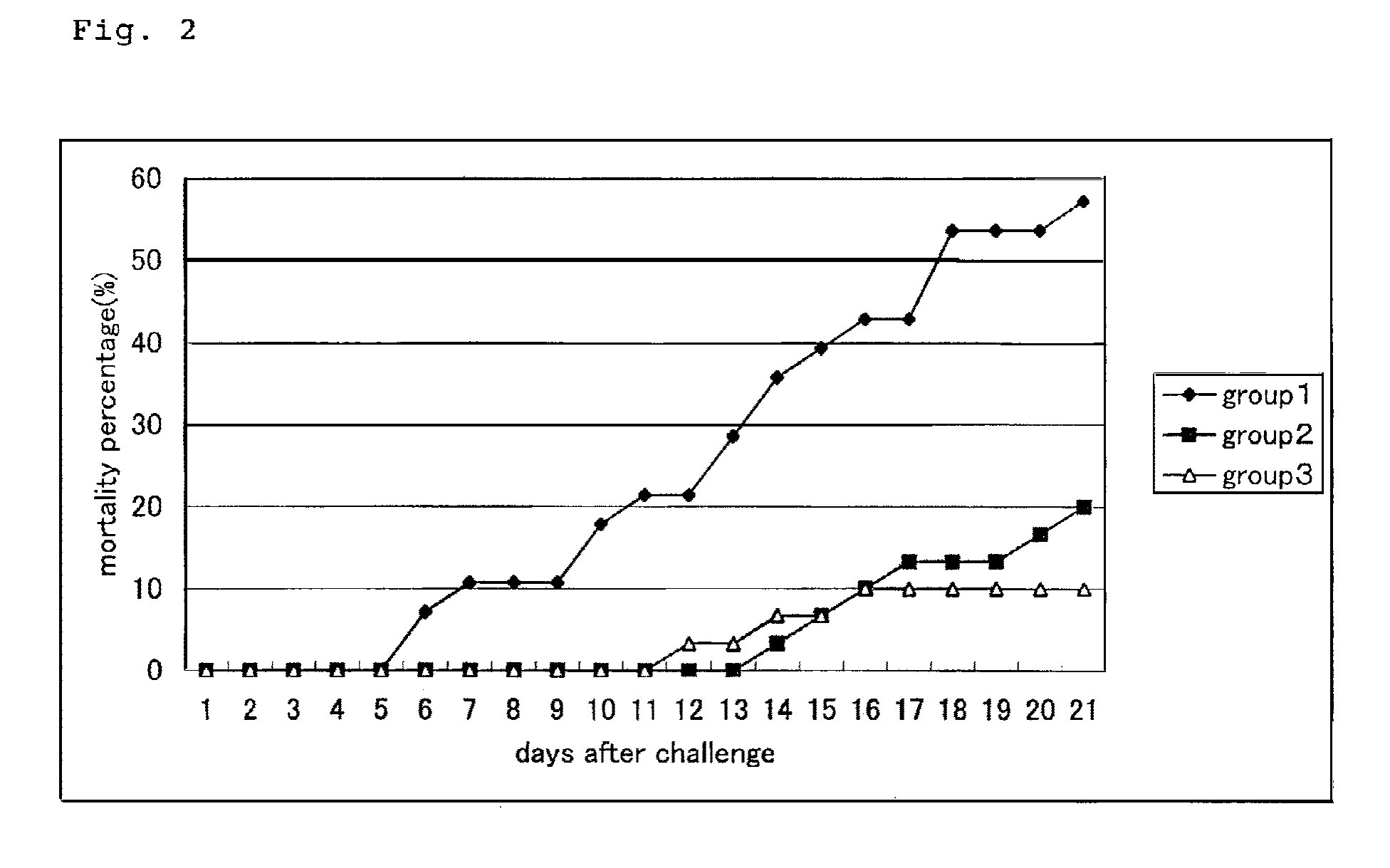DNA vaccine for Koi herpes virus (KHV) disease
a technology of koi herpes virus and khv, applied in the field of dna vaccine, can solve the problems of hardly induced cell immunity, side effects or risks, and difficulty in detecting and detecting khv, and achieve the effect of inducing the immune response of carps
- Summary
- Abstract
- Description
- Claims
- Application Information
AI Technical Summary
Problems solved by technology
Method used
Image
Examples
example 1
[0046]Translation initiation codon to translation stop codon of 5 types of glycoprotein genes and 5 types of membrane protein genes coded by the genome of KHV separated in Japan, United States and Israel, on which the present inventors have performed genomic analysis, were amplified by polymerase chain reaction (PCR). The primers used are shown in Table 1. As for template DNAs at the time of PCR, KHV-J separated in Japan was used. PCR condition was 30 sec at 95° C., 30 sec at 55° C., 30 sec at 72° C. ran as 1 cycle, which was repeated for 30 cycles.
[0047]
TABLE 1KHV-g1-FSEQ ID NO: 215′-ATGCCTGCCACCTTTGGCAG-3′KHV-g1-RSEQ ID NO: 225′-TCACCCCGCAGAGGTACCAT-3′KHV-g2-FSEQ ID NO: 235′-ATGTACCAGCAGCAATACCA-3′KHV-g2-RSEQ ID NO: 245′-TCAGTTGTGAAGAGTAGATT-3′KHV-g3-FSEQ ID NO: 255′-ATGAGCCACAGACAGCCAGC-3′KHV-g3-RSEQ ID NO: 265′-TCAGTAATAGTAATAGTTGT-3′KHV-g4-FSEQ ID NO: 275′-ATGCCGTCGAGCATGACTGG-3′KHV-g4-RSEQ ID NO: 285′-TCAGAGTTCGTCTCTGATGG-3′KHV-g5-FSEQ ID NO: 295′-ATGTCTATGCGCCCGCACAA-3′KHV-g5...
example 2
[0049]In the vaccine test, 50 μg of DNA per carp was inoculated to the dorsal muscle of a carp with 100 μL of phosphate buffered saline (PBS) by using an injector. At that time, various glycoprotein genes and membrane protein genes were inoculated respectively. As a negative control, vector plasmid DNA alone was inoculated. Carps were raised for 30 days after vaccine inoculation in a circulating filtration tank at 23° C.
[0050]In the infection test, branchiae of KHV infected carps were homogenized in PBS, and solution filtered with a 0.22 μm filter were inoculated at 100 μL per carp. After inoculating viral solution, carps were raised in a re-circulating filtration tank at 23° C.
[0051]After KHV infection, carps were observed for 12 days, and the accumulated mortality rate of carps was calculated. Results are shown in FIG. 1. As a test result, carps in the control area showed about 50% of accumulated mortality rate, while the accumulated mortality rate of carps in the vaccine test are...
example 3
[0052]A vaccine test was performed similarly to the above method. 5 types of glycoprotein gene (group 2) and 5 types of membrane protein gene (group 3) were mixed and inoculated, respectively. Vector plasmid DNA alone was used as negative control (group 1). Carps were raised for 30 days after vaccine inoculation in a re-circulating filtration tank at 23° C., and infection experiment was performed similarly to the above description.
[0053]After KHV infection, carps were observed for 3 weeks, and the accumulated mortality rate of carps was calculated. Results are shown in FIG. 2. As a test result, carps in the control area showed about 60% of accumulated mortality rate, while the accumulated mortality rate of carps in the vaccine test area was about 10 to 20%. Thus, the effectiveness of infection control by the DNA vaccine against KHV infection or vaccine effect was revealed.
PUM
| Property | Measurement | Unit |
|---|---|---|
| temperature | aaaaa | aaaaa |
| time | aaaaa | aaaaa |
| resistance | aaaaa | aaaaa |
Abstract
Description
Claims
Application Information
 Login to View More
Login to View More - R&D
- Intellectual Property
- Life Sciences
- Materials
- Tech Scout
- Unparalleled Data Quality
- Higher Quality Content
- 60% Fewer Hallucinations
Browse by: Latest US Patents, China's latest patents, Technical Efficacy Thesaurus, Application Domain, Technology Topic, Popular Technical Reports.
© 2025 PatSnap. All rights reserved.Legal|Privacy policy|Modern Slavery Act Transparency Statement|Sitemap|About US| Contact US: help@patsnap.com


